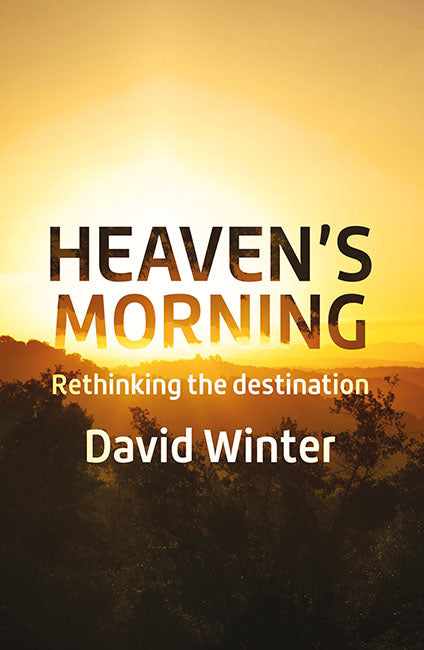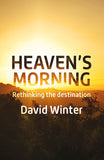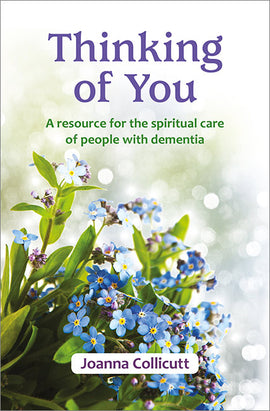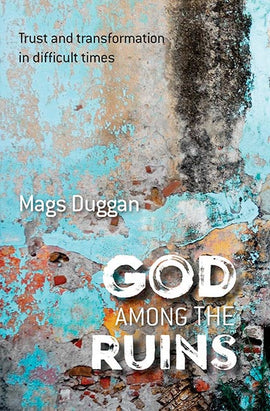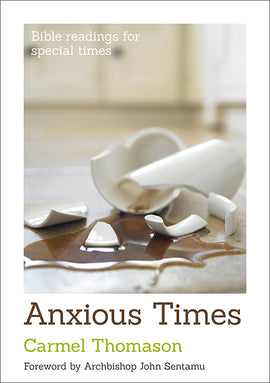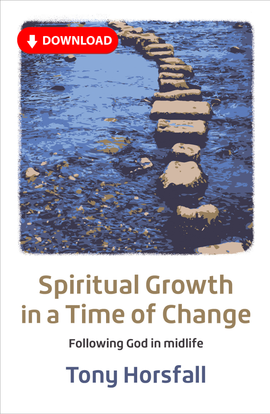Heaven's Morning: Rethinking the destination
The Bible - especially the New Testament - has plenty to say about resurrection and heaven, but many Christians struggle to make sense of what it actually means in practice. David Winter's accessible book explores the biblical teaching on what happens after death and considers what difference this can make to our lives here and now. He also shows how we can present what we believe about eternity as a source of hope to our sceptical, anxious world.
| Title | Heaven's Morning: Rethinking the destination |
| Author | David Winter |
| ISBN | |
| Description | The Bible - especially the New Testament - has plenty to say about resurrection and heaven, but many Christians struggle to make sense of what it actually means in practice. David Winter's accessible book explores the biblical teaching on what happens after death and considers what difference this can make to our lives here and now. He also shows how we can present what we believe about eternity as a source of hope to our sceptical, anxious world. |
| Details |
|
The Bible - especially the New Testament - has plenty to say about resurrection and heaven, but many Christians struggle to make sense of what it actually means in practice. David Winter's accessible book explores the biblical teaching on what happens after death and considers what difference this can make to our lives here and now. He also shows how we can present what we believe about eternity as a source of hope to our sceptical, anxious world.
Pobl Dewi, December 2016
David Winter has written a helpful and accessible book about what happens to human beings when we die. He declares his purpose early in the script: having assessed the spirit of the age as one 'which finds the whole business of death a painful reminder that no matter how clever we may be technologically and medically, this is how it inevitably ends', he goes on to say that the book is 'an attempt to address the issues raised by that situation'.
In setting out his stall in that way, Winter gives his readers the opportunity to evaluate how well he is able to respond. About halfway through, he tells his readers that the book is essentially about 'an eventual destiny for human beings, a place we have called heaven' and that is the nature of the movement which the author develops. The book is well written, positive in its approach and seeks to engage with our life experiences and common questions about issues of destiny by a review of the biblical materials.
Readers are introduced to biblical writers' use of metaphor and vision 'which are at the heart of biblical language about heaven'. Winter brings the discussion of heaven as our destiny down to earth in an interesting review of the accounts of bereaved people, indicating the continuity of life (at least in some way or other) of those whom they have lost. In a helpful chapter he considers this issue through the lens of the resurrection accounts of Jesus in the four Gospels. He also includes an interesting discussion of Paul's writing about the nature of the resurrection body in the later part of chapter 15 of his first letter to the Corinthians. This is timely, especially in the light of the current discussion following the contribution of Bishop NT Wright on the subject.
There is much good stuff in the book. Although he cannot tie all the loose ends together (as he candidly admits), Winter has written a book which definitely repays the commitment of reading it. It will be of interest to many readers, whether regular worshippers in church or not, and particularly those who could be described as being of advancing years.
David Winter is clearly a man of faith. However, I do not know how much importance he ascribes to faith in the heavenly destiny. While there is much helpful teaching in the book, I was left with the impression that the writer is of the school which holds that faith is caught, not taught. Read the book and come to your own conclusion!
Revd Patrick Mansel Lewis
Church Times 28 October 2016
The destination: death and then the end of everything, or heaven and the realisation of the human aspiration to live forever?
David Winter is an experienced pastor, and his book Heaven's Morning: Rethinking the destination has the principal merit of being essentially pastoral in its delicate and insightful commentary on the moment of death and unfurling of destiny.
His own experience stands him in good stead: he knows that, all too often, people's concerns about the afterlife are framed in simplistic questions: 'Will my cat/dog be there?', 'What about playing golf?' or, as he has come to hear more recently, 'Will there be shopping?'
His claim that, 'We believe in eternal life, not everlasting existence', immediately locates the discussion in a new place. A post-space-age theology can no longer comfortably see heaven in physical terms as being 'up there': the old metaphors no longer work but, rather than be driven to despair, Winter returns to the scriptures for a new reading of what the Bible actually has to say on our ultimate fate. He is determined to 'rebuild a credible doctrine of life after death', and, to do that, he has to 'do a demolition job on ideas which try to lock eternity into the language of earth'.
This means examining where the notions of the resurrection of the dead and 'Kingdom of God' were first laid down and how they were later used by Jesus. It means 'moving from the physical world of atoms and molecules into the spiritual world of God' and acknowledging that 'heaven is where God is'.
Winter is fearless: he examines the resurrection of Jesus, notions of hell, eternal life, judgement and heaven, leaving nothing out and always confidently explaining what it means to be 'gloriously, powerfully, spiritual'.
This is a short book, an unassuming book, but it deserves to do incredibly well and to be read both by people who mourn and by those who minister to them.
Lavinia Byrne
From Together Magazine January - February 2017
At only 109 pages of comfortable print this is an excellent book for looking at the biblical teaching of death and what happens after it. It is a blend of good Bible Study and topical modern research set out in what is, as you'd expect from David Winter, an easy-to-read style of short paragraphs and chapters that clearly spell out in absorbed sections what we can perhaps best expect as Christians for all the materials and ideas out there cluttering up our world and theology. This would be a good book for using as a study with an interested group (although there are no questions included in it). It is also a handy book perhaps to pass on to someone who has suffered a bereavement or worried about the nature of death and dying - gentle and insightful as it is.
Reviewed by Melanie Carroll
The Door - Diocese of Oxford, May 2017
You will have heard David Winter on the radio so know that what he says is sensible, personal and wise. His writing is just the same. Certainly, in Heaven's Morning, he writes simply and well; accessible stuff that covers not only whether there are cats in heaven (he thinks not: boo!), but also the whole story contained in the Old and New Testaments (fascinating). To write about what happens to us after death is, of course, impossible for no-one knows. David Winter is as honest about that as he is about understanding the raising of Lazarus. And it is because he is so open that this book is comforting and useful; it avoids being abstruse and academic, instead preferring to offer possibilities and hopes. '...a fleeting experience but... a foretaste of the glories to come.'
A key theme is a gentle analysis of the difference between 'everlasting' and 'eternal'. Too often we use the two interchangeably, however here we are urged to remember that 'everlasting' is a word based in time. Since time does not exist in heaven, there can be no such thing as 'everlasting life'. Life in heaven is 'eternal'. To explain just what he means, the author uses one of his own experiences, but one which will surely resonate with his readers: time stood still for him, there was no time, when, as a teenager, he first heard the slow movement of Beethoven's Seventh Symphony: a fleeting experience but, as he writes, a foretaste of the glories to come.
Although much of what Winter writes is comforting and positive, he has his fiercer moments too. There will be judgement, so, scarily, he lists the five 'Things that will not be in heaven' and the ten 'Things that will be in heaven'. They are intriguing and perhaps controversial lists.
To support his own case, he uses the book of Revelation. Indeed, throughout Heaven's Morning, Winter frequently refers to the Bible. Not obscure passages, but ones that are familiar: all part of his engaging style that affirms, rather than baffles, the reader.
Inevitably, he is at a loss to define precisely life after death, heaven. Yet he confirms that, as we have a gracious God, there will be resurrection, the resurrection that God, throughout the Bible, offers each one of us. What is that really like? God knows! Hallelujah!
Reviewed by the Revd Tony Lynn

